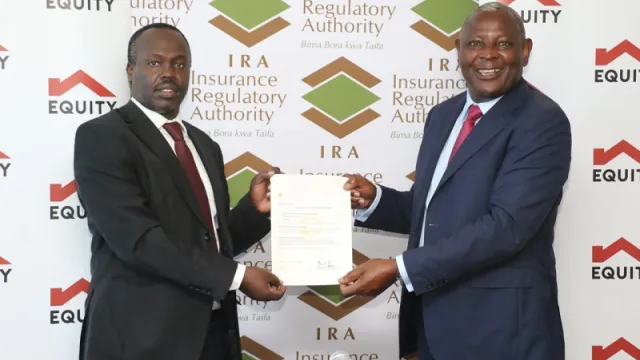Equity makes inroad into Kenya's insurance sector

Equity makes inroad into Kenya's insurance sector
Regional banking giant Equity Group has made inroads into Kenya's underwriting business after unveiling a new subsidiary, Equity Life Assurance (Kenya) Limited today.
The new outfit will most certainly have a head start, benefitting largely from the lender's mandatory loan policies on loan products along with other new business streams.
"We felt the need to make our contribution to the insurance industry and we believe we can make insurance to be understood better by the ordinary person," Dr James Mwangi, Equity Group Managing Director, and CEO.
Equity Life Assurance (Kenya) Ltd has now become the latest entrant into Kenya's insurance market after receiving a license to operate from Insurance Regulatory Authority (IRA).
IRA Chief executive, Mr Godfrey Kiptum, lauded Equity Group for adapting to the changing demands of the market as well as responding to the needs and aspirations of customers.
"As a Group, we are keen on protecting lives, livelihoods, and wealth and we hope to make protection more inclusive," said Dr Mwangi.
Read also: Credit guarantee deal to speed up loan flow to Nakuru SMEs
Kenya is ranked about fifth in Africa with respect to insurance penetration and many an increasing number of insurances are getting interested in the business, IRA chairman Abdirahin Abdi said.
Kenya's insurance industry has been marked by mergers and acquisitions as the big players gulp struggling insurers even as the regulator prepares to impose new capital adequacy rules.
The sector watchdog wants insurers to increase their capital in line with a new law, bringing to life a risk-based regime that would require firms to preserve cash.
The new regulation is expected to increase the current standard capital of Kes300 million for general business to Kes600 million or 20 percent of the net-earned premiums of the preceding financial year, whichever is higher.
Long-term business (life) insurers currently setting aside Kes150 million will raise their capital to Kes400 million, or five percent of the liabilities of the business for the financial year, whichever is higher, while a composite underwater will have to shore up capital to Kes1 billion.



